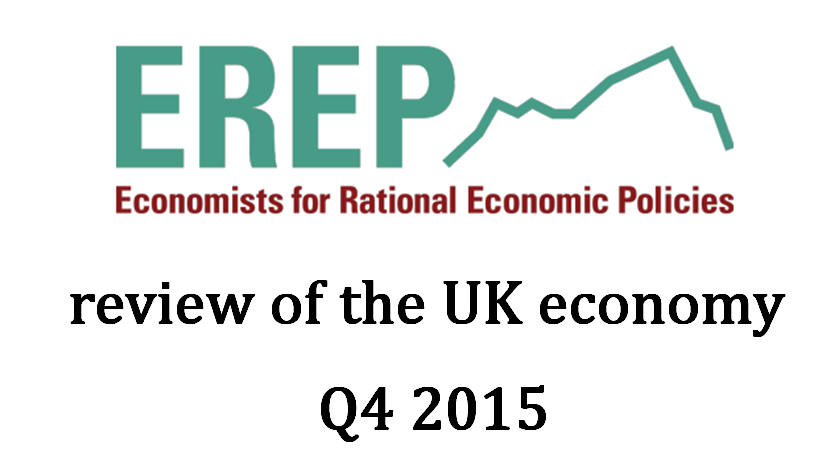The network ‘Economists for Rational Economic Policies’ (EREP) has just published its quarterly update review of the UK economy, taking on board the results of the 4th Quarter (Q4) GDP 2015 data (see ONS Q4 1st estimate and February Economic Review). It builds on and complements the EREP annual report, published in December, “The Cracks Begin to Show”.
In this latest Q4 review, Graham Gudgin and Ken Coutts (from the Centre For Business Research, Judge Business School, University of Cambridge) say:
Only four weeks before Christmas the Chancellor’s Autumn Statement, backed up by the OBR, painted a picture of good economic growth ‘better than anywhere else in Europe’…
In January all of this changed. The Chancellor echoed Janet Yellen at the Fed in warning about tough times ahead. The Chancellor was clearly getting his retaliation in first, and laying in excuses for an anticipated failure to generate the growth he had foreseen only a few months earlier.
The bad start of the year in the world’s largest stock markets appears to have spooked policy-makers, despite the generally poor correlation between stock markets and real economic performance. The new pessimism is however in line with our own macro-economic forecasts for the UK..
[Our forecasts] differ significantly from those of the Bank of England or the OBR, which are based on highly optimistic assumptions and essentially embody the supply-side optimism which asserts that the private sector will always quickly fill any gap left by public sector austerity… We expect growth in GDP to slow throughout much of the remainder of this parliament as cuts in government expenditure become more severe.”
Dr Jo Michell (University of the West of England) looks at the UK’s growing current account deficit, and shares their scepticism over what are seen as the OBR’s over-optimistic assumptions:
The OBR forecasts appear to be predicated on both supply-side optimism about the UK economy and an assumption that the global economic recovery will continue to gather pace. This looks an increasingly uncertain prospect as the Chinese economy slows and indicators suggest that the US recovery is running out of steam. If, as we believe to be the case, the UK’s recent mini-boom is now coming to an end in the broader context of a more generalised global slowdown, these forecasts for a rebound in foreign income look optimistic….
All of these trends – a current account deficit, slackening demand, cheap money and falling savings – point in the same direction. The British public will continue to borrow – from each other and from abroad. But the spending won’t translate into high-quality jobs and rising wages – instead it will lead to higher debts, ever-less affordable housing and an increasing likelihood of financial instability.”
Mary Robertson (University of Greenwich) analyses recent trends in the labour market and argues that despite headline positive results like falling unemployment,
Those assuming that the labour market is now recovered and will help drive broader economic recovery through 2016 may find they have engaged in excessive hubris. The extent and depth of labour market recovery is frequently overstated, while a number of threats looming over 2016 are likely to make recovery more fragile still.
The supposed recovery of real income growth last summer was limited, barely attaining pre-crisis rates of pay increase. Further, it has so far been short-lived, with wage growth falling to 2% in the three months to November 2015. The economy not only failed to make up for lost income growth over the eight years since the crisis, it has not returned pre-crisis levels.”
John Weeks (Professor Emeritus, SOAS) contends that the Chancellor’s fiscal policy, since 2010, represents in truth
…[A] fiscal trap – each budget tightens the spending belt, which in the next quarter means that the resulting counter-cyclical fall in public revenue means the Chancellor fails to meet his self-imposed fiscal target. That failure becomes a justification to reduce spending further. The Chancellor has peddled this dysfunction process for over five years as a strategy of recovery. This is not strategy, it is fiscal failure.





